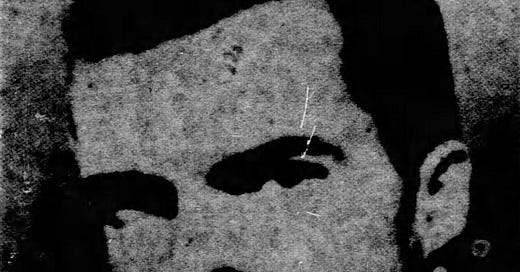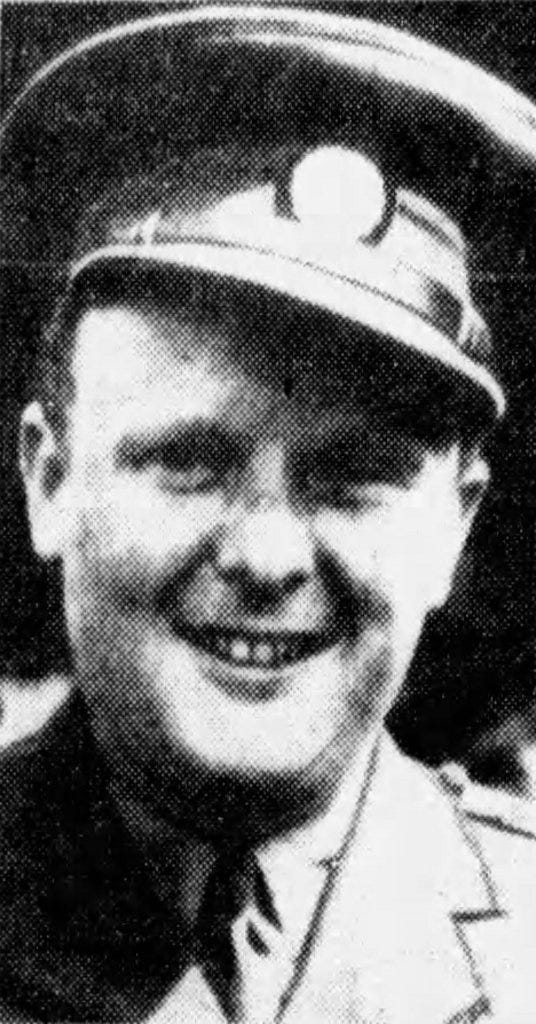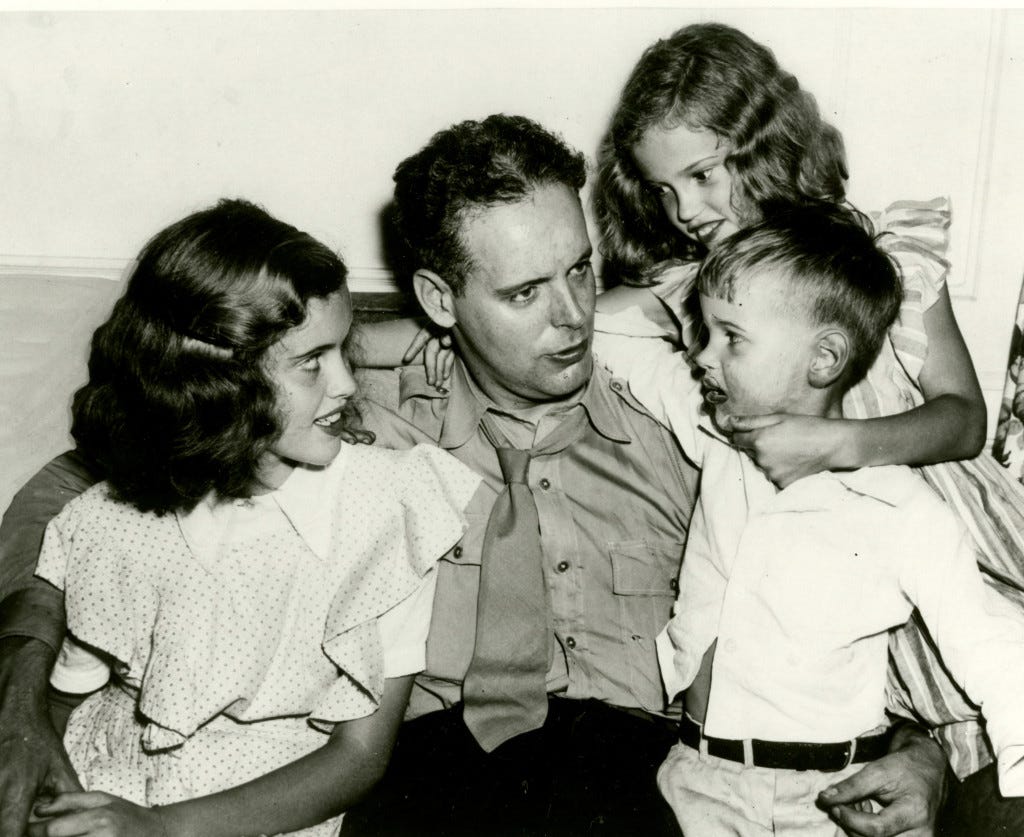Captured by the Nazis: War correspondent to POW
On the morning of September 12, 1944, Edward W. Beattie of United Press, Wright Bryan of the Atlanta Journal and John M. Mecklin of the Chicago Sun set off from the Third Army press camp east of Paris for what Mecklin expected to be "almost a pleasure trip -- a good story without the risks of visiting the front lines."
They were headed toward Châtillon-sur-Seine, where 20,000 German troops reportedly were ready to surrender. "Chaumont was on the way," Beattie wrote in his 1946 book, Diary of a Kriegie, "and we thought the Americans already held it. They didn't."
Driving south from Joinville toward Chaumont, their Army driver Jimmy Schwab slowed the jeep as they crossed a bridge guarded by two men wearing French Forces of the Interior armbands. Mecklin later described the scene:
Their guns were pointing toward Joinville, in a direction away from the Germans. When we passed, they eyed us in a peculiar, suspicious manner. There were none of the friendly waves you almost always get from the F.F.I. when on the road. It is quite possible that they were German outposts and that they signaled the Nazis down the road to get ready for us. But we will never know for sure.
The group continued down the "broad, smooth road" at nearly 60 miles an hour before they came came across debris in the road just north of Brethenay -- branches and telephone wire strewn across the road. "This looks like enemy country," Beattie said.
Schwab agreed, throwing the jeep in reverse -- a maneuver complicated by the trailer he was towing that contained the men's personal gear. About 50 yards into the evasive maneuver, German troops opened fire. Wrote Mecklin:
I half-dived, half-fell out of the back seat and scrambled into a ditch to the left of the road. Beattie, Bryan and the driver took cover under the jeep and the trailer. Slugs clunked into the jeep, ricocheted off the pavement and flicked through the trees.
I inched out of my raincoat, trying at the same time to hug the bottom of the ditch, and started crawling. The ditch was rocky and filled with dead leaves and twigs, but I was able to make pretty good speed.
I had gone about 75 yards when I risked a look down the road from behind a tree. Someone (Schwab, in Beattie's account) was waving a white handkerchief from our jeep. The shooting let up and I faced the problem of whether to surrender with the others or attempt to get away. The Jerries settled that. A bullet thumped into my tree.
Terrified the enemy troops might shoot him, the 26-year-old Mecklin decided he had no choice but to give himself up.
So I stood up with arms stretching skywards, and for the lack of anything else to say, I shouted "Hey!" figuring it would be better to draw their attention first. A very young, blond-haired Nazi came running with a rifle. He was as scared as I was. Sweat collected on his forehead and his hands were shaking.
I shouted: "Keine waffen!" (No arms.) He eyed me nervously, then went over my clothing thoroughly. He pointed towards the woods and asked, "kamerades?" I said, "nein." He spat and slapped my face.
That was the only maltreatment I received the whole time I was with the Germans. A few seconds later another Nazi came up and took over my custody.
While Mecklin emerged from that encounter unscathed, Bryan wasn't as fortunate. The jeep didn't provide enough cover for the 6-foot-5 correspondent, who was wounded in the left calf when the Germans opened fire.
"He just said quietly, 'I have been hit,' Beattie wrote. "I asked him if it was bad and he replied, 'No, it is just my leg and I couldn't feel it hit the bone.' I asked him if he wanted a cigarette and he said yes. I lit a couple and passed one to him. They tasted good."
Thankfully, the wound did not appear to be serious, and the four Americans were loaded into a truck and trundled off to Chaumont.
Our truck had to pick a way through several road blocks defended by machine guns on the road into town. We were taken immediately to headquarters in a small house on a hill overlooking the center of the city. Several spick and polished officers, headed by a blond major with the face and stature of a Notre Dame tackle, came out and greeted us with Nazi salutes and extreme courtesy.
The scene somehow reminded me of a tea party. We stood in the garden in the shake of an apple tree and made small talk about our capture. The Germans took the attitude that it was a dreadful shame it had to happen to such fine fellows as us and hoped we weren't upset.
The men were offered coffee and cigarettes, and an officer ensured the wounded Bryan had a comfortable chair in which to sit. After about 20 minutes of questioning, their captors decided Bryan should be taken to a local hospital, and Mecklin accompanied him. While Bryan remained at the facility, Mecklin was driven back to join Beattie, Schwab and three other American soldiers under guard at headquarters.
That evening, the six healthy prisoners were transported to a barracks in Chaumont, with Mecklin and Beattie permitted a quick stop by the hospital to wish Bryan well. Beattie described the scene in his diary:
Wright seems perfectly comfortable except for the fact that he is considerably too long for the six-foot bed into which he has been put, and must keep himself corkscrewed in order to fit.
He is the center of an admiring circle of French civilian patients, who apparently accept the fact that three American correspondents have been captured as earnest that the fighting troops can't be far behind.
Then it was on to confinement, where the six men were placed in one room and provided a dinner consisting of, in Mecklin's words, "six huge loaves of their ersatz bread, a big pan of butter, a massive chunk of cheese and a pot of cold coffee."
They eventually fell asleep but were awakened in the middle of the night by a German guard. In Mecklin's account, the German says one of the prisoners must go with him, and Beattie volunteers. The way Beattie tells it, he didn't have a choice -- "I had been picked because I spoke German and there was only one seat available in the car."
They drove until they reached Langres, where Beattie was allowed a couple hours' sleep. In the morning, it was off to Bourbonne-les-Bains, about 40 kilometers to the east. That was the first of numerous stops for Beattie over the next five weeks before he arrived at a permanent camp, Stalag III-D in Berlin, on October 19. In late January, Beattie and other prisoners were moved southeast to Stalag III-A in Luckenwalde, where he would spend the rest of the war.
Though the three correspondents were caught together, their paths diverged wildly once in captivity.
Mecklin once again had luck on his side. On September 13, he was placed in the charge of a German naval unit. The following day, that unit and others in the area were ordered to retreat from the onrushing Third Army -- retreat on foot toward Germany, some 100 miles away. After walking for miles, a guard with whom Mecklin had tried to establish a rapport "stopped and motioned to us to gather around."
We had no inkling of what was happening, but we recalled that just prior to his order he had dropped back and talked in a low voice with three other Germans, who were the only ones keeping up with us in that part of the column.
The guard put his fingers to his lips and glanced quickly down the empty road in both directions, then said: "You can go if you want to. If you run into those woods, you can get away before the rest of the column comes around the bend."
The thought flashed through my mind that they might be doing this as an excuse to shoot us. But it was a risk worth taking, and we had no alternative, anyway. So we saluted the corporal, shook his hand, and started running.
Mecklin and four other escapees soon reached the farming village of Jonvelle, where the 350-odd residents were only too happy to welcome them: "They took us to an ancient mill on the edge of the village and before long we were the center of attraction at a full-dress banquet," Mecklin wrote. They slept there Thursday night and spent all day Friday, September 15, in the village. The following morning, Allied vehicles rolled into town.
Before leaving Jonvelle we had to shake hands with nearly everybody in the town. They pinned Tricolor bunting to our field packets, kissed us, and treated us for all the world as though we had personally driven the Germans out of France.
Back in the Third Army press camp days after departing, it was Mecklin who told the story of the correspondents' ordeal to their peers. The initial story went out on the wires on September 19, a week after they had been captured.
But it would be some time before further news of Beattie and Bryan made it back home.
Finally, on December 23, American Red Cross president Basil O'Connor contacted the editors at the Atlanta Journal to tell them Bryan had been located at the Reserve-Lazaret hospital, which was affiliated with Stalag IX-C in Obermassfeld, northeast of Frankfurt.
At least Bryan's family had that peace of mind over Christmas. It took two more weeks before Beattie's mother in Sarasota, Florida, received a postcard from her son dated October 6 saying he was a prisoner of war. "Will be sent to another camp from which I can write more fully," he wrote. "Love, Ed."
Welcome as those notifications must have been, they were also outdated. By the time they arrived, Beattie was in Berlin and Bryan was at Oflag 64 in Szubin, Poland. That turned out to be good news indeed for the latter, as by January the Red Army was rolling toward the German border from the east.
On January 20, 1945, German guards warned prisoners at Oflag 64 that they should be prepared to evacuate at a moment's notice, and the able-bodied men departed on foot the following day. Bryan was not among them, as the bullet wound incurred during his capture had not yet healed. He was among a group of 91 patients and German medical staff left behind at the camp hospital to await the Russians.
Shortly after 10 a.m. on January 22, Russian officers arrived at the camp, borne by U.S.-built vehicles that brought "the reassuring 'beep, beep' of American horns" to the area as trucks sped on toward the German frontier. Wrote Bryan:
Meantime we sit here flying the American flag beside those of Russia and Great Britain. We are free to walk out the barbed wire gate if we have business in Szubin. By now we are confident this area is firmly in Russian hands and we know we will be evacuated soon.
It would take a while. The Bryan dispatch quoted here is dated February 20, the day Russian Maj. Roman Karmen, a correspondent for Izvestia, arrived at the camp and helped the American correspondent cable home his story. Bryan eventually made his way to Odessa and from there on to Paris by the end of March before eventually returning to the U.S. after the war in Europe ended.
He flew to New York on an Army C-54, then on to Atlanta in a C-47. Upon arrival on June 25, he was "swarmed" by his three children: Newell, 11; Mary Lane, 8; and Billy 4. His in-laws then served up the welcome-home dinner he had requested: fried chicken, biscuits, rice and gravy with fresh figs.
Russian troops would also liberate Ed Beattie, though it would take until the final days of the war. On April 22, exactly three months after Bryan and his cohorts were freed, the Red Army arrived at Stalag III-A.
Like Bryan in Szubin, Beattie would remain at the liberated camp for some time. Around 8 p.m. on May 3, Beattie and other Americans were enjoying a chicken dinner when word came down that two of the correspondent's colleagues, Robert Vermillion of United Press and Lou Azrael of the Baltimore News Post, had arrived at the camp, hearing they might find him there.
"A tallish, blond man in pants too big for him walked up, stuck out his hand and said with pent-up feeling, 'I'm glad to see you,'" Vermillion wrote. "'I'm glad I got here,' I replied and with those words United Press war correspondent Edward W. Beattie and, in effect, 10,000 American and British prisoners of war re-established contact with the English-speaking world."
The visiting correspondents spent the night in Luckenwalde and departed for Paris in the morning with their colleague in tow. Upon arrival, Beattie exulted in his freedom after nearly eight months in captivity:
At 7:00 p.m. I was celebrating liberation in champagne cocktails in Paris with a half dozen old friends. I have had a hot bath in a real bathtub. I have given my prison uniform to the maid to be burned, and have borrowed a completely clean uniform, with no lice. I have had three good American meals in one day, after months of the starvation rations which the Germans chose to give their prisoners.
I am free, and in a day or two Europe is going to be finally free as well -- free for a future which is uncertain, but free at least of the terrible fear which Hitler brought to the world.







